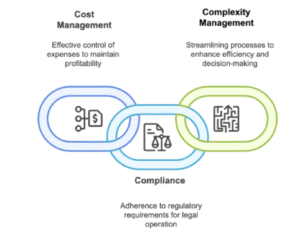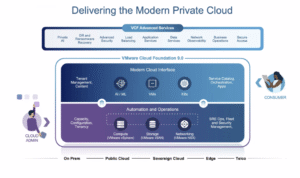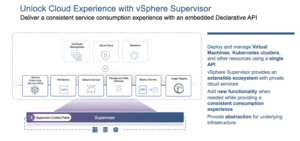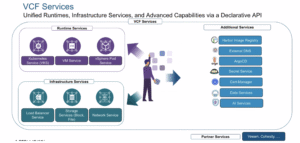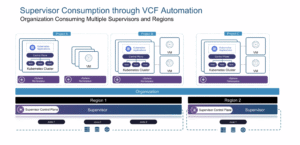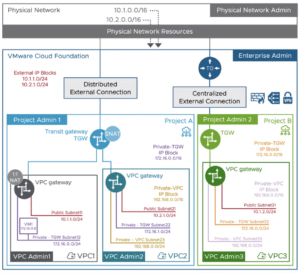Managing modern IT infrastructure means constantly balancing complexity with agility, performance with security, and automation with control. VMware Cloud Foundation (VCF) has long aimed to bridge that gap through an integrated platform combining compute, storage, networking, and management. With the release of VCF 9.0, VMware takes a leap forward delivering a smoother installation experience, enhanced lifecycle automation, and more intuitive day-to-day operations. In short, VCF 9.0 empowers IT teams to focus less on maintenance and more on delivering business value.
Whether you’re deploying in a greenfield data center or expanding an existing private cloud, VCF 9.0 significantly reduces the complexity traditionally associated with setup and daily operations.
Operational Simplicity in VCF 9.0: What’s New
Today public and private cloud applications are converging in a common scenario: Whether you’re going to build cloud-native applications or enhance traditional applications, the business needs are the same: readiness, service quality and costs. Even though the public cloud remains a great fit for startups and unpredictable workloads, many enterprises are exploring cloud repatriation as a strategic opportunity to consolidate resources and significantly reduce long-term operational costs.
That’s why infrastructure installation, operation and automation are the core areas that VCF 9.0 is going to address streamlining installation with an enhanced SDDC Manager, handling day 2 operations with some improvement in vSphere Lifecycle Management (vLCM) and without compromising compliance, governance and security.
Bringing the Best of Public Cloud Design to the Private Cloud
The private cloud is not dead… it’s evolving.
Before the Broadcom acquisition, VMware was already pushing to redefine what private infrastructure means in a cloud-native world. But for years, many organizations saw VMware through the lens of a traditional hypervisor company; powerful, yes, but rooted in operational complexity, siloed tools, and manual processes.
VCF 9.0 signals a definitive break from that past. It brings a cohesive, automated, and policy-driven platform designed not for yesterday’s virtualized data center, but for today’s private cloud: one that scales like the public cloud, integrates seamlessly with DevOps workflows, enables organizations to operate their infrastructure like a cloud platform, complete with full-stack automation, secure-by-default policies, and lifecycle consistency across compute, network, storage, and management.
Another improvement that clearly marks the shift from the traditional infrastructure concept to a coherent and unified, service-based vision is the introduction of a Unified Supervisor, which provides an extensible ecosystem with private cloud services like vSphere Kubernetes Service (VKS), Virtual Machines, Network Services, Storage, Data, Backup and Image Registry.
Finally, VCF speaks the cloud language: one API, one control plane, one core to rule all services.
VCF Services represent the evolution of how platform capabilities are delivered and consumed. Instead of relying solely on tightly coupled components, VCF 9.0 introduces a modular services-based architecture, allowing key capabilities such as workload domain provisioning, certificate management, lifecycle automation, and Kubernetes enablement…
This design makes it easier to update and scale individual services independently, improves fault isolation, while respecting cloud-native principles. This approach also enables third-party services to plug into the ecosystem, rebuilding a strong partner model with integrations from vendors like Veeam, Cohesity, and more.
With VCF 9.0, VMware introduces the concepts of Region and VPC (Virtual Private Cloud) to bring public cloud-like operational models into the private cloud.
A Region in VCF 9.0 is a logical boundary that groups together one or more workload domains under a shared management and policy framework. It allows organizations to isolate workloads by geography, function, or compliance requirement, and paves the way for multi-site and multi-tenancy architectures. Consequently, Supervisors and infrastructure components are logically isolated but managed through a single pane of glass.
Inspired by public cloud VPCs, a VPC is a tenant-like construct within a Region that encapsulates a set of infrastructure resources to build and manage logically isolated networks with custom IP addressing, routing, and security policies.
This is an important shift from infrastructure concept to platform: while network and infrastructure guys are reducing the management complexity, sysops and application teams in general are gaining the ability to define the network topology without compromising the infrastructure stability and the overall security.
Security in VMware Cloud Foundation 9.0 is no longer an afterthought: it’s embedded across the entire stack by design. VCF 9.0 introduces a more robust zero-trust architecture, ensuring that infrastructure components, services, and users are all verified, authenticated, and tightly controlled.
A key enhancement is the centralized certificate management, which automates the generation, rotation, and renewal of certificates across all VCF components. This reduces manual errors and ensures cryptographic hygiene at scale. Additionally, VCF 9.0 improves Role-Based Access Control (RBAC) with more granular roles, allowing organizations to define least-privilege access aligned with operational responsibilities.
VMware Cloud Foundation 9.0 represents an important evolution from traditional virtualization toward a modern, scalable, and secure private cloud. With native Kubernetes support, modular services, and public cloud–inspired constructs like Regions and VPCs, VCF 9.0 lays the groundwork for a unified infrastructure platform. This is the purpose-built platform for agility, automation, and operational excellence.
The VMware Cloud Foundation 9.0 Showcase: Powering the Modern Private Cloud was presented by VMware in association with Techstrong and Tech Field Day. The videos will be posted to the Tech Field Day YouTube channel and on the website. You can learn more about VMware Cloud Foundation 9.0 on the VMware website.

